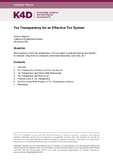| dc.contributor.author | Megersa, Kelbesa | |
| dc.date.accessioned | 2021-05-06T14:12:47Z | |
| dc.date.available | 2021-05-06T14:12:47Z | |
| dc.date.issued | 2021-01-08 | |
| dc.identifier.citation | Megersa, K. (2021). Tax Transparency for an Effective Tax System. K4D Helpdesk Report 942. Brighton, UK: Institute of Development Studies. DOI: 10.19088/K4D.2021.070 | en |
| dc.identifier.uri | https://opendocs.ids.ac.uk/opendocs/handle/20.500.12413/16584 | |
| dc.description.abstract | This rapid review examines evidence on the transparency in the tax system and its benefits; e.g. rising revenue, strengthen citizen/state relationship, and rule of law. Improvements in tax transparency can help in strengthening public finances in developing countries that are adversely affected by COVID-19. The current context (i.e. a global pandemic, widespread economic slowdown/recessions, and declining tax revenues) engenders the urgency of improving domestic resource mobilisation (DRM) and the fight against illicit financial flows (IFFs). Even before the advent of COVID-19, developing countries’ tax systems were facing several challenges, including weak tax administrations, low taxpayer morale and “hard-to-tax” sectors. The presence of informational asymmetry (i.e. low tax transparency) between taxpayers and tax authorities generates loopholes for abuse of the tax system. It allows the hiding of wealth abroad with a limited risk of being caught. Cases of such behaviour that are exposed without proper penalty may result in a decline in the morale of citizens and a lower level of voluntary compliance with tax legislation. A number of high-profile tax leaks and scandals have undermined public confidence in the fairness of tax systems and generated a strong demand for effective counteraction and tax transparency. One of the key contributing factors to lower tax revenues in developing countries (that is linked to low tax transparency) is a high level of IFFs. These flows, including international tax evasion and the laundering of corruption proceeds, build a major obstacle to successful DRM efforts. Research has also identified an association between organisational transparency (e.g. transparency by businesses and tax authorities) and stakeholder trust (e.g. between citizens and the state). However, the evidence is mixed as to how transparency in particular influences trust and perceptions of trustworthiness | en |
| dc.description.sponsorship | FCDO (Foreign, Commonwealth and Development Office) | en |
| dc.language.iso | en | en |
| dc.publisher | IDS | en |
| dc.relation.ispartofseries | K4D Helpdesk Report;942 | |
| dc.rights.uri | https://www.nationalarchives.gov.uk/doc/open-government-licence/version/3/ | en |
| dc.subject | Economic Development | en |
| dc.subject | Governance | en |
| dc.title | Tax Transparency for an Effective Tax System | en |
| dc.type | Helpdesk | en |
| dc.identifier.doi | 10.19088/K4D.2021.070 | |
| dcterms.dateAccepted | 2021-01-08 | |
| rioxxterms.funder | Default funder | en |
| rioxxterms.identifier.project | Default project | en |
| rioxxterms.version | VoR | en |
| rioxxterms.versionofrecord | 10.19088/K4D.2021.070 | en |
| rioxxterms.funder.project | 9ce4e4dc-26e9-4d78-96e9-15e4dcac0642 | en |

